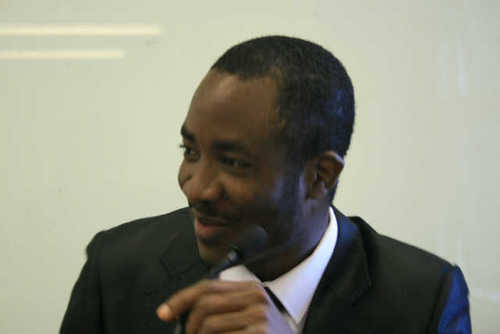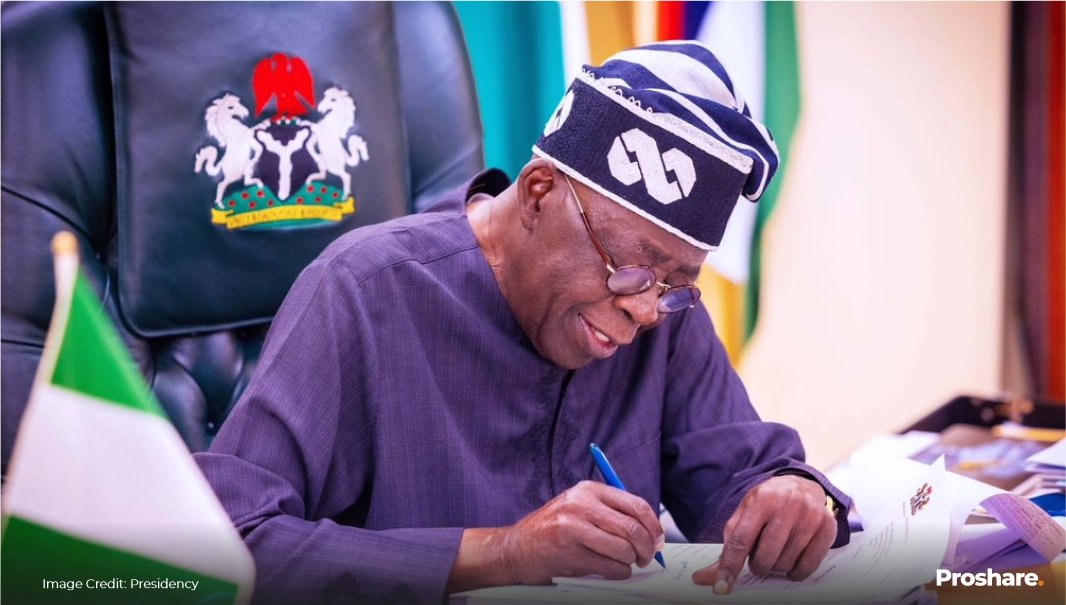Restructuring: A Quintessential Element Of Federalism
BY ADEDARA S. ODUGUWA

“… to achieve this laudable programme, APC government shall restructure the country, devolve power to the units, with the best practices of federalism and eliminate unintended paralysis of the centre (Source, APC constitution, 2015)”
How are you today? I hope you are used and coping with Acting President Yemi Osinbajo. Just last week, CNN queried about the whereabouts of our ageing and sick president, whose love for power is greater than his love for his health and performance as president of our recessed nation. Some of us are not perturbed, that is what you should expect from khakistocracy (government by the worse citizens). That is by the way. Today, I wish to talk about something that is no longer news for the past two months in Nigeria. In fact, it is trending in equal pedestal with the failing health of our ageing president, whom in recent times has become most expensive museum in the United Kingdom; ‘Restructuring’.
Restructuring has become the latest buzz word in Nigeria’s political landscape. We all talk about restructuring with many of us arguing for or against it without understanding what it connotes. A lot of us think restructuring means ‘suicide for the North and prosperity for the South or secession from united Nigeria and/or absolute control over the federal government ’– No. That’s not what restructuring is all about. In this article, I will take us through the meaning of restructuring, conditions under which a country should have unitary or federal constitution, historical antecedent of Nigeria’s federalism and elements of true federalism.
According to Oxford Dictionary (2017) restructuring is a noun which means ‘the process of organising differently: a plan to strengthen and reengineer a system’. Similarly, restructuring is the corporate management term for the act of reorganizing the legal, ownership,operational, or other structures of a company for the purpose of making it more profitable, or better organized for its present needs (Norley, Swanson & Marshall, 2011). This last definition looks at restructuring from the business angle and not the political sphere in the context of our usage today. Hence, defining restructuring in the context of a country means ‘ resource control, local and state autonomy, a moderately less-powerful central and redistribution of responsibilities (from the lists-exclusive, concurrent and residual) in ways that more powers are delegated to the constituents units in a defined sovereign state (Oduguwa,2017).
However, there are two groups of scholars on restructuring and federalism. While the first group supported the new buzz word, latter group argued such word is meaningless. Perhaps, it might be worthwhile for us to follow the debate in the following lines by asking what does restructuring mean to Nigerians?
During General Ibrahim Babangida’s 75th birthday (2016) in Minna, Niger State, he said “…devolution of powers…restructuring and devolution of powers will certainly not provide all the answers to our developmental challenges; it will help to reposition our mindset as we generate new ideas and initiatives that would make our union worthwhile. The talk to have the country restructured means that Nigerians are agreed on our unity in diversity; but that we should strengthen our structures to make the union more functional based on our comparative advantages.”
Similarly, former vice-president of Nigeria, Alhaji Atiku Abubakar describes restructuring as “There is no doubt that many of our states are not viable, and were not viable from the start once you take away the federal allocations from Abuja…we must devolve more powers and resources from the federal government and de-emphasise federal allocations as the source of sustenance of states…”
More so, Mr. Akin Osuntokun, former political adviser to former president Obasanjo describes restructuring as “restoration of federalism. The foundational constitution structure to which all Nigerians subscribed as encapsulated in the independent constitution of 1960. This constitution was violated in 1966 and the violation set in motion a chain of events that has culminated in the present abnegation of a 36 states structure against the four regional structures that emanated from the independent constitution.”
Further, my good uncle and friend, Chief Supo Shonibare argued “restructuring means independent self-sustaining federating units.” In the same vein, Chief Frank Kokori opined “In Nigerian terms when people talk about restructuring, they say they need true federalism. I don’t know what true federalism is because federalism is federalism… because of the military incursion into politics in 1966, Nigeria became a unitary government. So they were not following the tenets of the constitution that allows for devolution of powers to the federating units… If we had real federalism, there will not be agitations.”
Also, Chief Guy Ikokwu puts it straight “let’s return to regionalism with six zones as federating units.” In the words of Chief Edwin Clark “There is need for restructuring, there is need to go back to the kind of government we had before and after independence until the soldiers struck.” Additonally, Dr. Chukwuemeka Ezeife said “If we don’t get Nigeria restructured between now and next year, we may lose this country… founding fathers agreed on… regionalism and true federating units…”
According to a PDP governor, Dr. Ayodele Fayose “The APC governors not just been saying it; Aregbesola said it; Ajimobi and a host of others in the APC have said it; and now they have it as a group and we support their call for restructuring. But the problem I have is that the presidency is deaf to the voice of reason.” Moreover, Asiwaju Bola Ahmed allegedly said “We can’t make progress under current structure. No progress can be made under the current political system, which operates like a military unitary system.”
According to Prof. Wole Soyinka “I don’t understand Obasanjo’s language and Buhari’s language-we cannot continue to allow a centralization policy which makes the constituent units of this nation resentful; they say monkey dey work, baboon dey chop. And the idea of centralizing revenues, allocation system, whereby you dole out; the thing is insulting and it is what I call anti-healthy rivalry. It is against the incentives to make states viable.”
More so, Chief Ayo Adebanjo in what he entitled as ‘no restructuring, no Nigeria’ said “we are going for disintegration. That is what I am sorry about. You cannot keep the country together like this. You would continually be suppressing there and suppressing there. The Southern Kaduna affair, the people there shouted against regionalism, because of the oppression there. They said the Fulani were oppressing them.If you look at the recommendations of the 2014 National Confab, we said any area that has economic interests are free to stay together after a referendum of 71 percent. That was how we brought in regionalism. We did all that to make sure we stay together. If you look at the agitation of the South South, South East, they are not even insisting on restructuring; it is restructuring within Nigeria or outside of it. We even understand that some radical Yoruba have drawn the map of Oduduwa Republic and all that but we are keeping them down.”
In what can be described as the most constructive argument in favour of restructuring, erudite Emir of Kano and former CBN Governor Malam Sanusi Lamido Sanusi said “ If you really reflect on the problems of this country,it seems to turn common sense on its head. You sometimes wonder if anyone needs to tell any group of people that if you are a poor country, you do not need 36 governors, 36 deputy governors, with members of house of assembly, commissioners and advisers, special assistants, a president, a vice president, 36 ministers, special advisers, federal legislature and so on. Simple arithmetic will tell you that if you have that structure, you are first of all doomed to spending 80 or 90 percent of everything you earn maintaining public officers. It is really common sense but it seems to be a problem for us to understand it.”
In contrast, there are other people who believe that the word ‘restructuring’ is meaningless. The leader of this group is former President Olusegun Obasanjo who argued that“There is nothing wrong with Nigeria, but a lot wrong with Nigerians. The answer to most of our problems is mindset change and change of mentality. If we need any restructuring, it is the restructuring of our mindset and mentality.”
Similarly, APC National Publicity Secretary, Malam Bolaji Abdullahi said restructuring is in the party’s manifesto but would be difficult to implement now. In his words “I don’t think it would be a wise move to add the challenges of restrutucting if you have not dealt with the problems that affect the average Nigerian. So when people are hungry, when people are losing jobs, when people’s salaries are not being paid I think any responsible government would consider this to be a priority even while it still believes in the restructuring of the country. The issue of restructuring is never a gimmick. It is in the manifesto of our party.”
Similarly, Arewa Consultative Forum argued “Arewa Consultative Forum wish to lend its voice to the debate as to whether or not to restructure the Federation of Nigeria. However, ACF has observed with regret that in most cases,the discussions are taking place without regard to our present democratic structure, as the issues are in some cases presented as ‘demand’ by one group or the ‘other’. Unfortunately, in most cases they are followed up by some ultimatum to the government to accept of face deadly consequences. It should be clear to all the agitators that restructuring a complex,big and diverse country as Nigeria is a serious business that must take account of the views of all its citizens, and not just of those that shout the loudest. More so, such discussions must be free of threats, intimidation or blackmail from any group or individual. A genuine restructuring must therefore be just,fair and equitable to all. ACF therefore calls for a due process through our present democratic structure rather than just crass agitation, if we are to achieve true federalism.”
In what may be described as the most inflammatory statement of all time, Coalition of Arewa Youth said “The Yoruba are the most ungrateful stock in Nigeria. Having given them power on a platter of Gold in 1999 as a way of compensating them for the June 12 Saga, it is quite worrisome and unfortunate that they have lived up to their legendary reputation of backstabbing and betrayal by supporting divisive calls for restructuring or dismemberment of the nation against the will and desire of the north (The Trent, June, 27: 2017).”
In what looks like the position of Buhari led administration, Acting President and Senior Advocate of Nigeria, Prof. Yemi Osinbajo had argued “ …even if states are given half of the resources of the federal government, the situation will not change. The only change is to diversify the economy… it is a false narrative that nations formed the way ours was formed is bound to fail. Term mere geographic expression is not original to Nigeria. It is also false narrative that we are better off when ethnic groups are on their own. While different groups have strength we are better united. It is also not true that those who make marginalization charges are altruistic. Often what they are saying is ‘I am marginalized, appoint me’.”
However, from logs of definitions given to restructuring, one could clearly see the quintessential elements in these descriptions; “devolution of power, fairness, constituents units autonomy, resource control, regionalism, state police, de-emphasise federal allocations and true or real federalism.”These elements, no doubt are subset of the set federalism. In other words, Nigerians talk of restructuring as a result of an adulterated federalism. Hence, next section of the article would do justice to historical antecedents of Nigeria’s federalism and conditions under which unitary and federalism are suitable.
Literarily, federalism is a system of government in which government have powers to delegates the power to other elected member of the states (Gauge, 2014). In federal system of government, constituent units enjoy some rights as are available to the independent states. Also, power is jointly shared between the state and federal governments. Unitary system of government on the other hand is that form of government in which power is vested in one single central authority (as found in military government) and where there is no devolution or delegation of power to the constituent units (Oduguwa,2017). However, of the UN 192 member states, 165 are governed as unitary state (UN, 2017).
Examples of countries that presently practicing federalism include; Argentina, Australia, Austria, Belgium, Bosnia and Herzegovina, Brazil, Canada, Comoros, Ethiopia, Federated States of Micronesia, Germany, India, Malaysia, Mexico, Nigeria, Pakistan, Palau, Papua New Guinea, Russia, Saint Kitts and Nevis, South Africa, Switzerland, United Arab Emirates, United States of America and Venezuela (Aberdeen Business School, 2014).
While countries that practices unitary system of government includes; Abkhazia, Afghanistan, Albania, Algeria, Angola, Armenia, Azerbaijan, Bangladesh,Belarus, Benin, Bolivia, Botswana, Bulgaria, Burkina Faso, Burundi, Cameroon, Cape Verde,Central African Republic, Chad, Chile, China, Colombia, Congo, Costa Rica, Croatia, Cyprus, Cuba, Czech Republic, Democratic Republic of Congo, Djibouti, Dominica, Dominican Republic, Donetsk People’s Republic, East Timor, Ecuador, Egypt, El Salvador, Equatorial Guinea, Eritrea, Estonia, Fiji, Finland, France, Gabon,Gambia, Georgia, Ghana, Greece, Guatemala, Guinea, Guinea-Bissau, Guyana, Haiti, Honduras, Hungary, Iceland, Indonesia, Iran, Ireland, Israel, Italy, Ivory Coast, Kazakhstan,Kenya, Kiribati, Kosovo, Kyrgyzstan,Laos, Latvia, Lebanon, Liberia, Libya, Lithuania, Luhansk People’s Republic, Macedonia,Madagascar, Malawi, Maldives, Mali, Malta, Marshall Islands, Mauritania, Mauritius, Moldova, Mongolia, Montenegro, Mozambique, Myanmar, Nagorno-Karabakh Republic, Namibia, Nauru, Nicaragua, Niger, North Korea, Northern Cyprus, Palau, Palestine, Panama, Paraguay, Peru, Philippines, Poland, Portugal, Romania, Rwanda, Samoa, San Marino, Sao Tome and Principe, Senegal, Serbia, Seychelles, Sierra Leone, Singapore, Slovakia, Slovenia, Somaliland, South Korea, South Ossetia, Sri Lanka, Suriname, Syria, Tajikistan, Tanzania, Togo, Transnistria,Trinidad and Tobago, Tunisia, Turkey, Turkmenistan, Uganda, Ukraine, Uruguay, Uzbekistan, Vanuatu, Vietnam, Yemen, Zambia and Zimbabwe.
Also unitary monarch states include; Andorra, Antigua and Barbuda, Bahrain, Bahamas, Barbados, Belize, Bhutan, Brunei, Cambodia, Denmark, Grenada, Jamaica, Japan, Jordan, Kuwait, Lesotho, Liechtenstein, Luxembourg, Morocco, Netherlands, New Zealand, Norway, Oman, Papua New Guinea, Qatar, Saint Lucia, Saint Vincent and the Grenadines, Saudi Arabia, Solomon Islands, Spain, Sweden, Thailand, Tonga, Tuvalu, United kingdom and Vatican City (Aberdeen Business School, 2014).
However, what is obvious is the fact that more than three quarter of the world operates unitary system of government. What is vital to understand is the reason of adopting unitary or federal in these countries. In the book entitled ‘Thoughts on the Nigerian Constitution’ (1966), Chief Obafemi Awolowo listed conditions under which unitary and federal constitution are suitable. What we must know is that there is no good or bad system of government depending on the circumstances of the people in terms of culture, diversity, boundary, size, religion and other socio-economic factors. In stating his argument, Chief Awolowo argued;
“… in any country where there are divergences of language and of nationality-particularly of language- a unitary constitution is always a source of bitterness and hostility on the part of linguistic or national minority groups. On the other hand, as soon as a federal constitution is introduced in which each linguistic or national group is recognized and accorded regional autonomy, any bitterness and hostility against the constitutional arrangements as such, disappear. If the linguistic or national groups concerned are backward or too weak vis-à-vis the majority group or groups, their bitterness or hostility may be dormant or suppressed. But as soon as they become enlightened and politically conscious, and/or courageous leadership emerges amongst them, the bitterness and hostility come into the open, and remain sustained with all possible venom and rancour, until home rule is achieved. Also, a federal constitution is usually a more or less dead letter in any country which lacks any of the factors conducive to federalism. Hence, the following conclusions can be deduced;
- If a country is unilingual and uni-national , the constitution must be unitary;
- If a country is unilingual or bilingual or multilingual, and also consists of communities which, over a period of years, have developed divergent nationalities, the constitution must be federal, and the constituent states must be organized on the dual basis of language and nationality;
- If a country is bilingual or multilingual, the constitution must be federal, and the constituent-states must be organized on a linguistic basis;
- Any experiment with a unitary constitution in a bilingual or multilingual or multinational country must fail in the long run.
We are now in a position to asseverate , categorically and with all the emphasis at our command, that, since Nigeria is a multi-lingual and multinational country par excellence, the only constitution that is suitable for its peculiar circumstances is a federal constitution.” p49.
However, argument of Chief Awolowo in Calabar Prison in 1966, remain the contention today. The Nigerian nation has failed tremendously in horizontal and diagonal directions and actors have not only exhausted their talents and strengths but are as well confused. It is not for the president or any of his agents to tell us what is right in the midst of wrongs. We are no nonentities! If call for federalism should fail, what alternative is in place? This concern leads us to the vital elements of federalism as agreed by the founding fathers in October 1st, 1960:
- Head of State: There should be only one head of State for the whole of the federation, whose office should be purely ceremonial
- Head of Government: The Head of Government in the Federation or in a constituent state should be directly elected by the registered electors in the Federation or State.
- Appointment of Ministers: Ministers may be appointed from outside, or from among the Members of Parliament.
- Entry into the Civil Service: The Civil Service should be divided into classes –such as Professional Scientific, Technical, Administrative, Executive and Clerical; and entry into each class, other than the Professional, Scientific, and Technical classes, should be competitive examination… Promotion within each class should be by merit. All employees of statutory boards, corporations, commissions, or bodies, shall be deemed to be members of the Civil Service for purposes of first appointments and promotions.
- Constituent States: The organisation of the country into constituent states should be on linguistic basis; provided however, that:
- No one or two states shall be so large in size and population as to be able to overrule the other states and bend the will of the federal government to its own; and
- No state shall be so small as to be unable to maintain its independence within the sphere of functions allotted to it.
- Human Rights: Fundamental human rights should be entrenched in the constitution ; and there should be provisions to the effect that nothing in the constitution or in any law should derogate from such entrenched human rights, except in time of war and emergency, and in so far as is necessary to secure respect for the rights of others.
- Normative Social Objectives: The constitution should declare and entrench normative social objectives which the Federation should pursue in the fields of economic, politics, education and health.
- Separation of Powers: There should be separation of powers amongst the three organs of state, namely: the legislature, the executive and the judiciary.
- Organic Laws: As far as possible, provisions should be made in the constitution concerning the detailed structure of each of the three organs of the state.
- Division of Functions: The constitution should make express provisions for:
- Exclusive Federal Legislature functions;
- Concurrent legislative functions; and
- Residual functions to be vested in the state legislature.
- Jurisdiction of Federal Commissions: The following bodies should , in the discharge of their respective functions, have jurisdiction in all parts of the Federation:
- The Public Service Commission;
- The Judicial Service Commission; and
- The Electoral Commission.
- Code of Conduct: A code of conduct should embodied in the constitution which shall prescribe Rules of Discipline by which ministers and other specified functionaries , in all the branches of each of the organs of the State , shall be bound and guided. Appropriate sanction against any violation of the code should also be provided for in the constitution.
- Qualifications of Judges: Only a barrister or solicitor who possesses one or more recognized university degrees with at least second-class honours in one, and has at least 10 years’ practice at the bar, or in the alternative , 5 years’ practice at the bar plus 5 years’ experience as a magistrate or court official, should be appointed as a judge.
- Franchise: Electoral franchise throughout the federation should be based on universal adult suffrage.
- Common Roll of Voters: There should be one common roll or register of voters for all elections in all parts of the federation.
- Structure of parliaments:The federal Parliament should be bi-cameral; whilst the state legislatures should be uni-cameral.
- General Elections: General elections to the federal and state legislatures as well as the elections of the Heads of Federal and State Governments should be held every Five Years on the same day throughout the federation.
- Registration of Political Parties: Political parties should be registered with the Federal Electoral Commission (Now Independent National Electoral Commission); but only a political party which is national both in character and operation and whose membership is open to all Nigerian citizens should be so registered.
- Election of Candidates: Every candidate for election, whether or not he is opposed by any other candidate or candidates at such election, shall be voted for.
- Membership of Legislature: Every member of the Federal or State Legislature should be directly elected by the electors in the constituency which he represents.
- Automatic Loss of Seat: A member of parliament who resigns his membership of, or is expelled from, the political party on whose platform he was elected into Parliament shall automatically lose his seat in Parliament.
- Unrestricted Eligibility: Every Nigerian citizen should be qualified to stand for election in every part of the Federation.
- Dissolution of Legislatures: All Federal and State Legislatures should stand automatically dissolved Thirty Days before the expiration of Five years from the date on which the immediately preceding General Elections were held into the said Legislatures. No legislature shall be dissolved otherwise.
- Equal Legislative Powers: The two Federal Houses of Parliament should have equal legislative powers.
- Secularity of State Legislature: The Federal Parliament or Government should not have the power to suspend or perform the functions of a regional legislature or Government in any circumstances, save when the Federation is at war.
- Dissolution of Local Government Council: The State Legislature or Government should not have the power to suspend or dissolve a local government council in any circumstances, during the council’s statutory term in office.
- Local Government Councils: Elections to local government councils should be conducted every three years, and at least three-fourths of the members of any such council should be directly elected by the registered voters in the area of the council.
- Alteration of the Constitution: Any provision of the constitution, made in pursuance of this and the forgoing twenty-eight basic principles, should be entrenched, and should be altered only by the people in a referendum (Awolowo, 1966).
However, the forgoing highlights are basic elements that must be present in our Federalism. More so, what Nigerians should understand is that federalism (restructuring) is not injurious to any of the federating units. In other words, true federalism means prosperity, equality, fairness, development and transparency for all the regions, religions, clans and people in the union or boundary of a nation. Many people kick against federalism because of greed and ignorance. Nevertheless, a true patriotic Nigerian should not hesitate to ask;
Why are some people afraid of federalism? Why is President Buhari, Acting President Osinbajo, Obasanjo and others against true federalism? What are we going to lose if we have federalism? Why is APC not ready to implement its manifesto on federalism as written in the party’s constitution? If the present system (unitary in practical terms) would work, when will that be? If we duly reject federalism (since national assembly and presidency have rejected it), what alternative do we have? Is federalism same as secession? These are vital questions we should ask ourselves before we start to make unholy comments on restructuring.
Before I go, it is necessary to link what is happening presently to views of the founding fathers on the entity called Nigeria:
Sir Ahmadu Bello once said “The new nation called Nigeria should be an estate of our great-grandfather, Uthman Dan Fodio. We must ruthlessly prevent a change of power. We use the minorities of the North as willing tools and the South as a conquered territory and never allow them to rule over us, and never allow them to have control over their future.”
Similarly, Chief Awolowo in a speech he delivered in London, November 3, 1961 said “If rapid political progress is to be made in Nigeria, it is high time we were realistic in tackling its constitutional problems. Nigeria is not a nation. It is a mere geographical expression. There are no ‘Nigerians’ in the same sense as there are ‘English’, ‘Welsh’, or ‘French’. The word ‘Nigerian’ is merely a distinctive appellation to distinguish those who live within the boundaries of Nigeria from those who do not.”
Dr. Nnamdi Azikiwe once said “My parents are natives of Eastern Nigeria, the arsenal of republicanism in Nigeria. Although I am Ibo,yet I speak Yoruba and I have a smattering of Hausa. I am now Premier of Eastern Nigeria, the land of my fathers, which lies five hundred miles from the place of my birth in Zungeru, in Northern Nigeria… Each of our three Regions is vastly different in many respects, but each has this in common: that, despite variety of languages and custom or difference in climate, all form part of one country which has existed as a political and social entity for fifty years. That is why we believe that political union of Nigeria is destined to be perpetual and indestructible.”
Sir Abubakar Tafawa Balewa, speaking at the Legislative Council in 1948 said “Since 1914 the British Government has been trying to make Nigeria into one country, but the Nigerian people themselves are historically different in their backgrounds, in their religious beliefs and customs and do not show themselves any sign of willingness to unite, Nigerian unity is only a British intention for the country.”
In contrast, by 1957 (three years to Nigeria’s independence) Sir Balewa made a U-turn “I am pleased to see that we are now all agreed that the Federal system is, under present conditions, the only sure basis on which Nigeria will remain united. We must recognize our diversity and the peculiar conditions under which the different tribal communities live in this country.”
Chief Alex Ekwueme said in 1992 “Ours is hardly a Federation except in name.”
Chief Adekunle Ajasin was reported to have said “Our Federalism is upside down. We are not practicing Federalism in Nigeria.”
Therefore, all over the world, views and aspirations of any group of people who felt marginalized is heard through referendum. This should be same with Nigeria. Unity or union is negotiable. I urge our learned Prof. of law and Acting President of Nigeria to be civic and put sentiment or personal interest aside, on issue of federalism. In practical terms, what we practice today is not federalism and whether we like it or not, if we continue to live under this structure, failure is inevitable. Also, I urge all Nigerians to seek knowledge, and rise up to their responsibilities and civic obligations. You don’t need to be a lawyer before you know and understand the Nigerian constitution. It is your civic right!
Finally, we should stop spreading hate speeches about restructuring, even if you are benefiting from the present government. Whether you are APC or PDP or private person, it is imperative for all of us to work very hard in unison to push Nigeria to higher grounds, where prosperity, fairness, equity, social justice is not only possible but the only option available among alternatives. That is only possible through federalism!
Adedara is a social commentator, author and human resources expert, who writes from Sagamu, Ogun State.
Email: Adedaraoduguwa@yahoo.com







